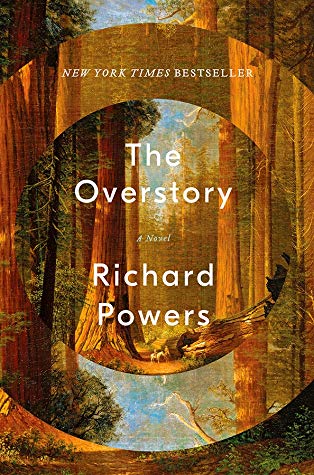Book Notes: The Overstory
The Overstory
by Richard Powers
Read
Jan 29, 2020 -
Feb 23, 2020
⭐⭐⭐⭐
I don’t usually post notes about fiction, but I was so taken with Richard Powers’ The Overstory that I felt[1] the urge to share my enthusiasm about it.
Others have said that they had trouble getting through this book, that there were too many florid descriptions of trees for them to wade through, that the stories didn’t quite connect. I can see why. This is a book about trees and their relationships with humans, and it does at times move at the pace plants growth.
For me, the reflections and truths in this novel more than made up for the slower pace of the story (it takes about 100 pages before you start seeing how the different threads will weave into a larger narrative). I connected with the more lyrical parts of the book, which often lean more towards poetry than novel.
It is an introspective book, one that focuses on the internal lives of its characters. So if you’re looking for a fun action-oriented romp, this is not the book for you. This is an open-ended book, not a story that ends tied up with a neat bow. It asks more questions than it answers, and that’s a good thing.
Book highlights
Your kind never sees us whole. You miss the half of it, and more. There’s always as much belowground as above.
Here it is, the fabled free banquet of America—yet one more windfall in a country that takes even its scraps right from God’s table.
His respect for the cleverness of ants grows without limit. Flexible behavior in the face of changing conditions: What else can you call it but wicked smart?
Soon the world will be returned to the healthy intelligences, the collective ones. Colonies and hives.
Things with clean, concise, right answers are antidotes to human existence.
Paying attention decimates your speed.
But in Douglas Pavlicek’s psychic economy, paying attention is nowhere near as important as staying busy.
In fact, it’s Douggie’s growing conviction that the greatest flaw of the species is its overwhelming tendency to mistake agreement for truth. Single biggest influence on what a body will or won’t believe is what nearby bodies broadcast over the public band.
The confirmation of others: a sickness the entire race will die of.
He’s not sure where he’s going. Since his last flight as a loadmaster, such knowledge has been an impossible luxury.
The words that father and son write arise and start doing. The boy has just turned eight, but in this moment, he comes home. He has found a way to turn his innermost hopes and dreams into active processes.
“Plant-blind. Adam’s curse. We only see things that look like us. Sad story, ain’t it, kiddo?”
As certain as weather coming from the west, the things people know for sure will change. There is no knowing for a fact. The only dependable things are humility and looking.
But the senses never have much chance, against the power of doctrine.
They aren’t self-reliant. Everything out here is cutting deals with everything else.”
There is great, joyous, and essential work to do. But first a person needs to graduate from endless self-love.
The branch wants only to go on branching. The point of the game is to keep playing.
Now his life has a luxury he’s never had: a destination, and someone to head there with.
The game seems childish, at first. But all of art is childish, all storytelling, all human hope and fear.
She marvels again at how the planet’s supreme intelligence could discover calculus and the universal laws of gravitation before anyone knew what a flower was for.
What is it within us that gives us this need not just to satisfy basic biological wants, but to extend our wills over things, to objectify them, to make them ours, to manipulate them, to keep them at a psychic distance?
Long past the hour when his clenched fists would have given out, they whoop descant to the storm.
He knows only that these people—the tiny few immune to consensual reality—have a secret he needs to understand.
Consciousness itself is a flavor of madness, set against the thoughts of the green world.
NO TO THE SUICIDE ECONOMY
The product here is not so much books as that goal of ten thousand years of history, the thing the human brain craves above all else and nature will die refusing to give: convenience.
Ease is the disease
Somewhere in all these boundless, compounding, swelling canyons of imprinted paper, encoded in the millions of tons of loblolly pine fiber, there must be a few words of truth, a page, a paragraph that could break the spell of fulfillment and bring back danger, need, and death.
All that’s left to sell up here is nostalgia, those recent yesterdays when tomorrow seemed the answer to everything a human might ever want.
Useful is the catastrophe.
Just look. Looking must correct and heal all thoughts.
This is her freedom. This one. The freedom to be equal to the terrors of the day.
How reason is just another weapon of control. How the invention of the reasonable, the acceptable, the sane, even the human, is greener and more recent than humans suspect.
Nothing has more power than simple conviction.
Four billion years of evolution, and that’s where the matter will end. Politically, practically, emotionally, intellectually: Humans are all that count, the final word. You cannot shut down human hunger. You cannot even slow it. Just holding steady costs more than the race can afford.
The fear of suffering that is her birthright—the frantic need to steer—blows away on the wind, and something else wings down to replace
[1] I say “felt”, in past tense, because I drafted these notes a couple of months ago, and forgot to publish them until now.
